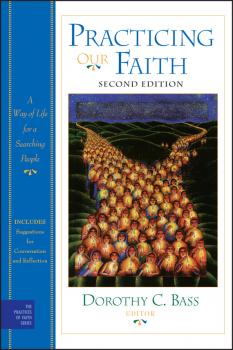ТОП просматриваемых книг сайта:
Dorothy Bass C.
Список книг автора Dorothy Bass C.Аннотация
In this spirituality of time, Dorothy Bass invites readers into a way of living in time that is alert to both contemporary pressures and rooted ancient wisdom. The celebrated editor of Practicing Our Faith asks hard questions about how our injurious attitude toward time has distorted our relationships with our innermost selves, with other people, with the natural world, and with God. As an alternative to the rhetoric of management and mastery, Receiving the Day offers a language of attention, poetry, and celebration. Bass encourages us to reevaluate our understanding of the temporal and thereby to participate fully in the Christian practice of knowing time as God's gift. Embraced in this way, time need not be wrestled with each day. Instead, time becomes the habitation of blessing.
Информация о книге
Автор произведения Dorothy Bass C.
Аннотация
An updated edition of the down-to-earth resource that offers twelve practices to make Christian faith a way of life Many Christians are looking for ways to deepen their relationship with God by practicing their faith in everyday life. This best-selling guide helps take belief out of the realm of theory and shows how to live it out in a series of twelve central practices such as hospitality, forgiveness, healing, testimony, and keeping Sabbath. Designed to work across a wide range of Christian laypeople, leaders, denominations, and study groups, this is the second edition of the book that Theology called «… a stimulating contribution to the work of making explicit the connection between what Christians do and what they believe.» Contains information on the practices discussed in the book and shows how they relate to and intersect with prayer, worship, and Bible study Offers a guide for conversation, learning, and growth at the back of the book This updated and expanded new edition includes a new introduction and two additional chapters that describes new insights into and experiences with the «practicing our faith» approach The book includes a variety of prominent contributors, who draw on their rich shared experience as believers, theologians, ethicists, and educators.
Информация о книге
Автор произведения Dorothy Bass C.


